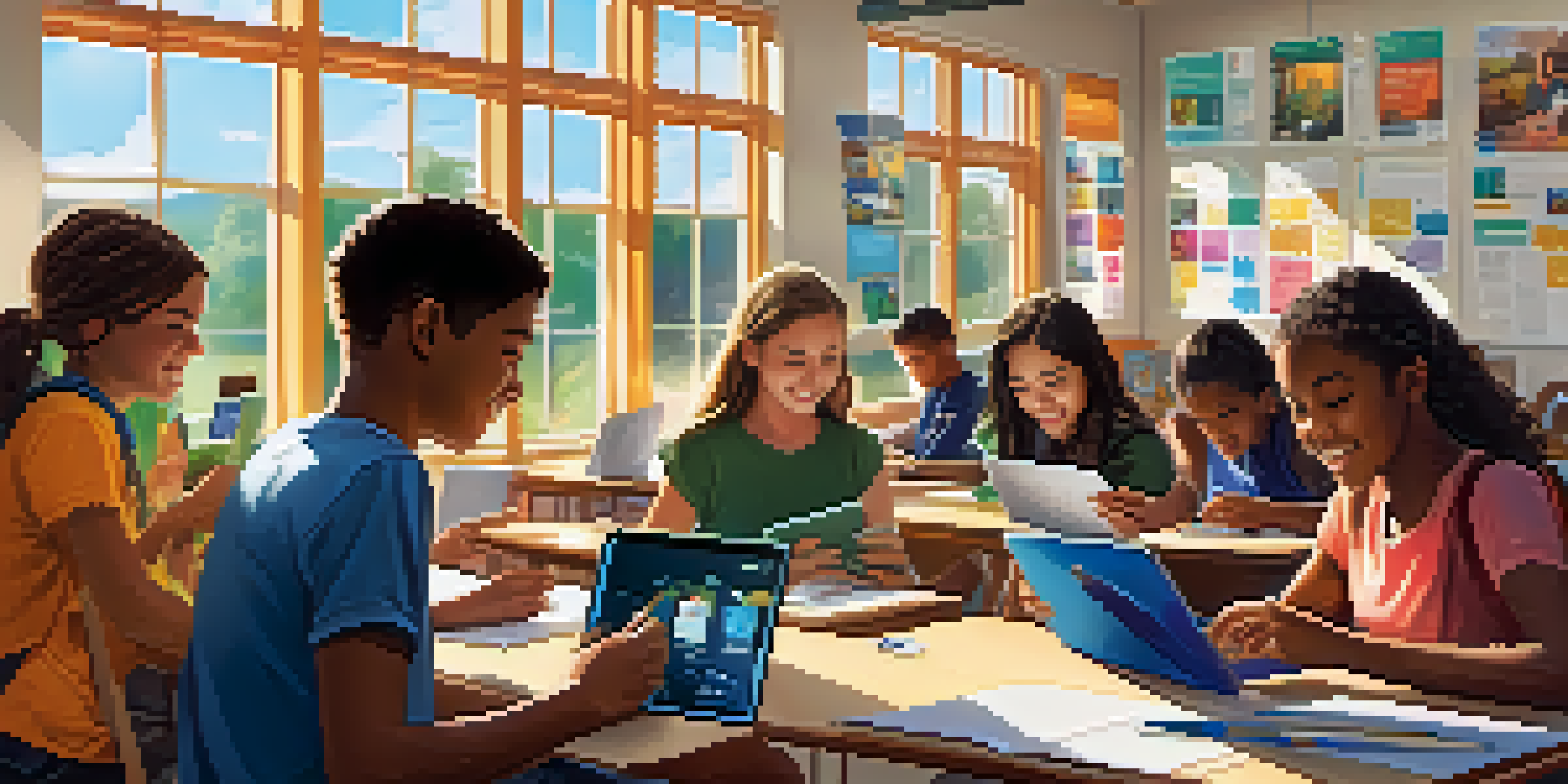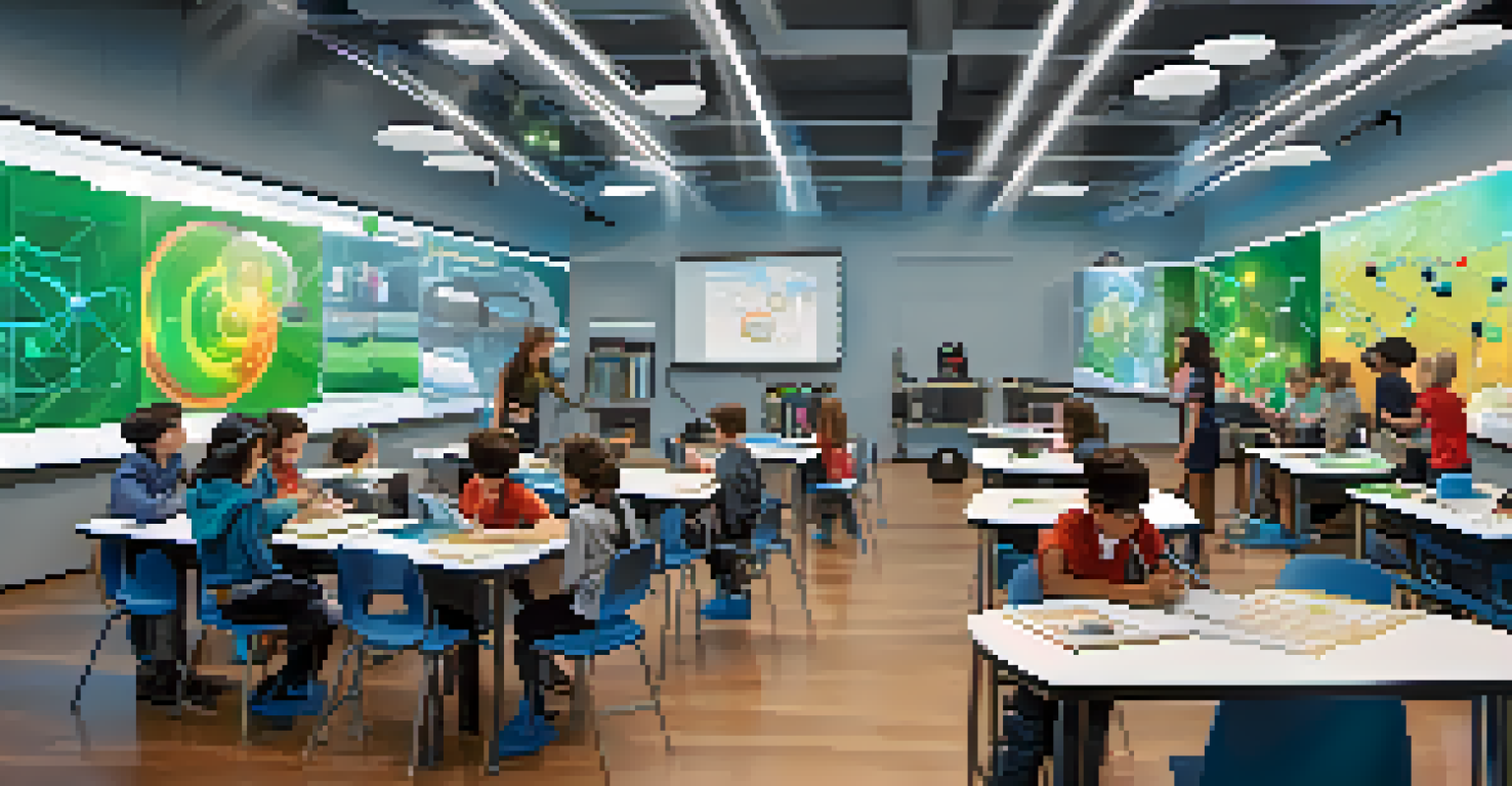Enhancing Learning Outcomes Through Mobile Technology Access

The Role of Mobile Technology in Modern Education
Mobile technology has transformed the educational landscape, making learning more accessible than ever. With smartphones and tablets, students can access a wealth of information right at their fingertips. This shift not only aids in traditional learning environments but also supports remote education, bridging gaps for those in underserved areas.
Education is the most powerful weapon which you can use to change the world.
For instance, a student in a rural area can join online classes and access the same resources as their urban counterparts. This democratization of knowledge is pivotal in leveling the playing field. As educators adapt to these tools, they can create more engaging and interactive learning experiences.
Moreover, mobile devices facilitate personalized learning. Students can progress at their own pace, revisiting concepts they find challenging while advancing quicker through areas they grasp easily. This adaptability enhances overall learning outcomes.
Access to Diverse Learning Resources
One of the significant advantages of mobile technology is the access it provides to diverse learning resources. From educational apps to online libraries, students can find materials that cater to their unique learning styles. This variety not only fosters engagement but also encourages self-directed learning.

For example, a student struggling with math can find interactive apps that offer step-by-step tutorials, while another might prefer video lectures on the same topic. This tailored approach helps maintain motivation and interest. Additionally, the ability to access resources anytime and anywhere further empowers learners to take control of their education.
Mobile Tech Enhances Learning Access
Mobile technology democratizes education by providing students, regardless of their location, access to diverse learning resources.
As a result, students become more independent and resourceful, skills that are invaluable in both academic and professional settings. The proliferation of digital content encourages exploration and curiosity, ultimately enriching the learning experience.
Fostering Collaboration Among Students
Mobile technology also plays a crucial role in fostering collaboration among students. Platforms like discussion forums and group chats enable learners to communicate and share ideas effortlessly. This interaction not only enriches the learning experience but also builds essential teamwork skills.
Technology will not replace great teachers, but technology in the hands of great teachers can be transformational.
Imagine a group project where students from different locations can collaborate in real-time through shared documents and video calls. This level of connectivity encourages diverse perspectives and enhances problem-solving abilities. By working together, students can learn from each other, which deepens their understanding of the subject matter.
Moreover, these collaborative tools can help shy or introverted students participate more actively. They often feel more comfortable expressing their views in a digital format, leading to a more inclusive learning environment.
Real-Time Feedback and Assessment
With mobile technology, real-time feedback has become a game-changer in education. Teachers can quickly assess student understanding through quizzes and polls conducted via mobile apps. This immediate response allows for timely intervention, ensuring that students do not fall behind.
For instance, if a teacher notices many students struggling with a particular concept during a live poll, they can address it right away. This adaptability helps students grasp challenging content before moving on. Additionally, continuous assessment through mobile platforms keeps learners engaged and motivated.
Collaboration Boosts Student Engagement
Mobile platforms facilitate collaboration among students, enriching their learning experiences and building essential teamwork skills.
Furthermore, students can receive instant feedback on their submissions, allowing them to reflect and improve continuously. This ongoing dialogue between students and educators enhances learning outcomes and fosters a growth mindset.
Enhancing Engagement Through Gamification
Gamification is an innovative way mobile technology enhances student engagement. By incorporating game-like elements into learning, educators can make lessons more enjoyable and motivating. This approach encourages students to tackle challenges and rewards them for their achievements.
For example, educational platforms that use points, badges, or leaderboards can motivate students to complete assignments and participate actively in discussions. This friendly competition can lead to increased participation and a positive classroom atmosphere. Students often find themselves more invested in their learning when it's fun.
Moreover, gamified learning experiences can cater to different skill levels, ensuring that all students can participate and benefit. By making education enjoyable, mobile technology helps create lifelong learners who are eager to explore new concepts.
Bridging the Digital Divide
Despite the many benefits of mobile technology in education, the digital divide remains a significant challenge. Not all students have equal access to devices or internet connectivity, which can hinder their learning opportunities. Addressing this issue is crucial for enhancing learning outcomes for all students.
To bridge this gap, schools and communities must work together to provide resources and support. Initiatives like lending programs for devices or community Wi-Fi hotspots can help ensure that no student is left behind. By making technology accessible, we can create a more equitable educational landscape.
Real-Time Feedback Improves Outcomes
With mobile tech, educators can offer real-time feedback, enabling timely interventions that enhance student understanding and motivation.
Moreover, raising awareness about the importance of digital literacy can empower students to utilize technology effectively. Teaching them how to navigate online resources and use educational tools prepares them for future success in an increasingly digital world.
The Future of Learning with Mobile Technology
Looking ahead, the future of learning with mobile technology is promising. As advancements continue, we can expect even more innovative tools that enhance educational experiences. Artificial intelligence (AI) and augmented reality (AR) are just a couple of examples of technologies that can further enrich learning.
Imagine students using AR to explore historical sites or conduct virtual science experiments from their smartphones. These immersive experiences can make learning more engaging and memorable. As technology evolves, educators will have the opportunity to create increasingly interactive and dynamic learning environments.

Ultimately, the goal is to harness these advancements to provide students with the best possible educational experiences. By embracing mobile technology, we can prepare learners for a rapidly changing world, equipping them with the skills they need to succeed.